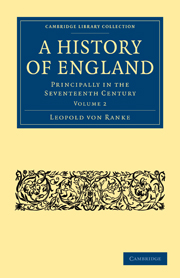Book contents
- Frontmatter
- Contents
- BOOK VI GOVERNMENT IN ENGLAND WITHOUT THE PARLIAMENT. TROUBLES IN SCOTLAND
- BOOK VII CONNEXION BETWEEN THE TROUBLES IN SCOTLAND AND THOSE IN ENGLAND AND ELSEWHERE
- BOOK VIII THE LONG PARLIAMENT AND THE KING, DOWN TO THE OUTBREAK OF THE CIVIL WAR
- INTRODUCTION
- CHAP. I Summoning of the Parliament
- CHAP. II The first sittings of the Long Parliament
- CHAP. III Progress of aggressive tendencies in the Lower House
- CHAP. IV Attempt at a Reaction
- CHAP. V Parliamentary and popular agitation. Execution of Strafford
- CHAP. VI Concessions and new demands
- CHAP. VII Charles I in Scotland
- CHAP. VIII Days of the Grand Remonstrance
- CHAP. IX Formation of a new Ministry. Tumultuous agitation in the Capital
- CHAP. X Breach between the King and the Parliament
- BOOK IX THE ENGLISH CIVIL WAR, 1642—1646
- BOOK X INDEPENDENTS AND PRESBYTERIANS. FATE OF THE KING
CHAP. VI - Concessions and new demands
Published online by Cambridge University Press: 07 June 2011
- Frontmatter
- Contents
- BOOK VI GOVERNMENT IN ENGLAND WITHOUT THE PARLIAMENT. TROUBLES IN SCOTLAND
- BOOK VII CONNEXION BETWEEN THE TROUBLES IN SCOTLAND AND THOSE IN ENGLAND AND ELSEWHERE
- BOOK VIII THE LONG PARLIAMENT AND THE KING, DOWN TO THE OUTBREAK OF THE CIVIL WAR
- INTRODUCTION
- CHAP. I Summoning of the Parliament
- CHAP. II The first sittings of the Long Parliament
- CHAP. III Progress of aggressive tendencies in the Lower House
- CHAP. IV Attempt at a Reaction
- CHAP. V Parliamentary and popular agitation. Execution of Strafford
- CHAP. VI Concessions and new demands
- CHAP. VII Charles I in Scotland
- CHAP. VIII Days of the Grand Remonstrance
- CHAP. IX Formation of a new Ministry. Tumultuous agitation in the Capital
- CHAP. X Breach between the King and the Parliament
- BOOK IX THE ENGLISH CIVIL WAR, 1642—1646
- BOOK X INDEPENDENTS AND PRESBYTERIANS. FATE OF THE KING
Summary
King Charles thought that he should be able to direct the government in spite of the preponderance of parliamentary power. At the same time with the attainder of Stafford he signed the bill which made the dissolution of Parliament dependent on its own consent. He expected that this would be given when the pressing questions were settled. His own conviction seems to have been that hitherto he had grasped at too much, and he induced himself to make other great concessions.
He had already allowed the substitution, in the patents of appointments of the judges, for the clause which made their tenure of office dependent on the pleasure of the government, of another which made it depend on good behaviour, and so put an end to that arbitrary removal of judges which made them subservient to the government. This was a change of universal political significance, since the dependent position of the bench of judges was recognised as the origin of those decisions in favour of the crown on which the government had based its pretensions. Now however all those courts were attacked which, at least in part, had served as instruments of arbitrary power, especially the Court of High Commission, by which the spiritual jurisdiction had obtained absolute authority over every deviation from the principles of the Anglican Church.
- Type
- Chapter
- Information
- A History of EnglandPrincipally in the Seventeenth Century, pp. 272 - 279Publisher: Cambridge University PressPrint publication year: 2010First published in: 1875



